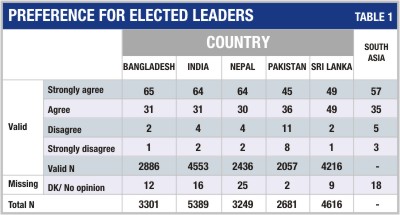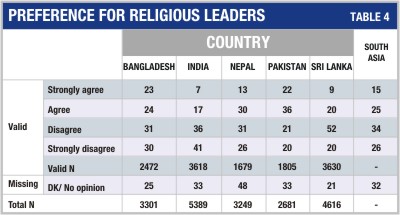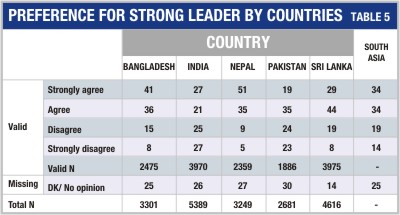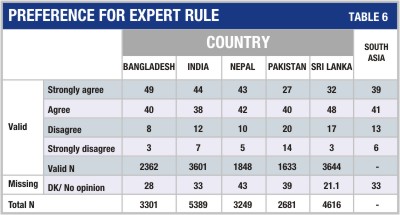
Inside
|
How deep is support for democracy in South Asia? Yogendra Yadav and Suhas Palshikar present the thought-provoking findings of their comprehensive region-wide study on support for democracy in South Asia
This is true of the stark option of democracy vs. dictatorship; and between army rule and democracy, people prefer democracy. Election is the mechanism agreed to by most people to decide who should govern them. Does actual existence of electoral democracy generate greater support for the idea of electoral democracy? Comparatively fewer people in Pakistan than in other countries uphold the idea of electoral democracy. So we hypothesize that democracy produces support for itself; in other words, the existence of democracy is likely to generate legitimacy for itself. This, however, does not imply that interruptions in democratic practice, as in the case of military rule, necessarily diminish the legitimacy of the idea of democracy: even in its absence, the democratic norm enjoys a fair amount of acceptability among the people. Even in the case of Pakistan, where there is an intermittent history of military rule, people are in favour of being governed by those elected through fair elections. Thus, in Pakistan, nineteen per cent disagree with the idea that elected leaders should govern the country, whereas in other countries, less than six percent hold this view. This compares with World Values Survey findings from the 2001 round that asks people if they prefer the "democratic system." Approval rating was 98% in Bangladesh, 93% in India, and 68% in Pakistan. Pakistan was second from the bottom of the list, above only Russia. In response to a question that specifically mentions democracy, the answers are equally clear: There is a clear rejection of dictatorship as an alternative to democracy. Once we adjust for "Don't Know" responses, each country has the same level, except Pakistan. In Pakistan, too, it is not direct opposition, but indifference.
There is a good deal of comparative evidence available for this question. Level of support for democracy in South Asia is the same as that in East Asia (is better if we exclude Pakistan), higher than in Latin America (53 per cent), but lower than in Africa (73 per cent). If we carefully look at the responses in Pakistan, we can notice that the response is not to the idea of democracy but to the experience of democracy. Thus, support for democracy does not depend much upon the length of experience but the nature of experience of democratic government. Rejection of non-democratic forms Subtle non-democratic forms
The issue of preference for religious leaders over politicians is probably the more complicated one. The question wording assumed that religious leaders influence political choices in the electoral arena while being outside the gamut of competitive electoral politics. We witness somewhat mixed response to the role of religious leaders: ambivalence in Bangladesh, support in Pakistan, and rejection in other countries. The ulema in Pakistan and Bangladesh do play a significant political role, although they may not directly contest elections. The rise of Hindutva politics in India has meant that leaders claiming religious following try to win the political sympathies of the voters. The clout enjoyed by the Buddhist monks in the politics of Sri Lanka is, similarly, a clear interference by religious leaders in the political process. However, religious leaders enjoy popularity and acceptability and do not formally demand the rejection of electoral democracy; they only exploit the mechanism of electoral democracy to elect representatives who support the role of religious leaders in the politics of the country. Therefore, as Table Four shows, a substantial population prefers that religious leaders rather than politicians should take all major decisions.
However, it is not clear whether people accept that religious leaders, too, can play political roles, or that they should replace the politicians. The distinction between politician and religious leader is perhaps not clear or valid. At the same time, it is important to note that the question specifically refers to replacement of the politicians, and yet there is a widespread support for the religious leaders and their role. This indicates the possibility that people, though agreeing to the democratic norm, may also be agreeable to some sub-democratic or para-democratic forms of politics also. Politics is seen as too competitive, faction-ridden and therefore, whenever an alternative with a potential to enforce order and reduce competition presents itself, there are some takers for it. Strong leader is another such sub-democratic alternative upheld by large numbers. The term leader implies a certain amount of acceptability and popularity of the person concerned, it implies popular support and legitimacy; in fact, many democracies throw up leaders who derive their "strength" from the fact of the popular base they enjoy. Once such leadership is established, or has emerged, the leader may by-pass democratic norms and become extra-ordinarily powerful. South Asia has had its share of such "strong" leaders in the form of, among others, Ms Indira Gandhi in the seventies in India, Mr Bhutto in Pakistan, and Sheikh Mujibur Rahman in Bangladesh. Our question asked whether such "strong" leaders -- who do not have to bother about elections -- are preferred.
Table Five above indicates that there is large scale acceptance of this formulation in all the five countries. People seem to be willing to have a strong leader who will overcome the infirmities of competitive politics. It is of course possible that the wording: "Who doesn't have to bother about elections" is either ignored by the respondents or read differently. Respondents may assume mandate and popular acceptance as integral parts of "leadership," and, hence, may not find anything wrong in leaders asserting themselves. In fact, the people may look upon such leaders and their strength as an antidote to the bureaucratization and anonymity of decision making. Thus, this table is open to two opposite readings. On one reading, this seems to be approval for sub-democratic forms of exercising power. On another reading, it may appear that there is intrinsic approval of mandate and popular control, though there is apparent neglect of the formal mechanical processes of bureaucratically translating that mandate into a legal-institutional format. The political genius of South Asia excels more in normative approval than in formal institutional operations and therefore, it may just be possible that by approving "strong leadership" the people are not choosing non-democratic over democratic, but redefining democratic in a less legal-institutional fashion than is appreciated by political theory.
This same riddle of interpretation confronts us with respect to the preference for expert rule. Of the three "sub-democratic" options, the third finds the highest acceptability. This is to be expected given the turn in the nature of public political decision making in most societies today. Preference for religious leaders is sub-democratic because it implies that competitive politics is bypassed in favour of the wisdom of the religious leader. Preference for a strong leader is sub-democratic because it presupposes the secondary role of formal institutional mechanisms of competition. Expert rule is sub-democratic in the sense that it presupposes the dichotomy between politics and expertise, politics and public interest. Yet, a majority is in favour of expert rule; they see this as the right way of governing the country. Thus, popular imagination allows the co-existence of the norm of democracy and these sub-democratic aspects. Yogendra Yadav is Senior Fellow at the Centre for the Study of Developing Societies, Delhi, India. Suhas Palshikar is Professor of Politics at the University of Pune, India. Endnote
Located at the Centre for the Study of Developing Societies (CSDS), Delhi, the study was jointly coordinated by Peter R. De Souza, Suhas Palshikar, and Yogendra Yadav. International IDEA and the Department of Sociology, Oxford University were the other partner institutions. Resources for this study were made available by the Ford Foundation (Asia Program) and EU-India Program. Footnote: All figures (except for N) in percentages of the respondents in the unit specified in each column head. The figure for South Asia is from merged data set with equal weights for each country. |
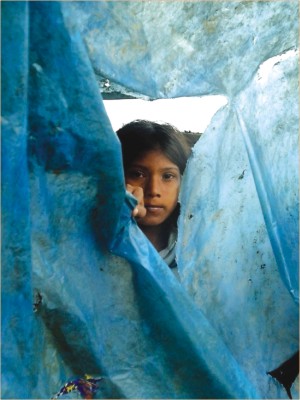 S
S